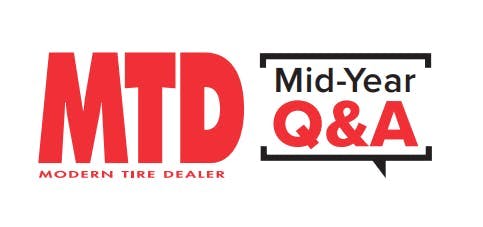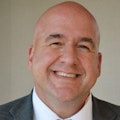MTD Mid-Year Q&A: Why Yokohama TWS Is Investing in North America
Paolo Pompei, CEO of Yokohama TWS, explains why the company is making big investments in North America and how customers will benefit. (Editor's note: this interview was conducted weeks before Pompei was named new CEO of Nokian Tyres on July 20. According to Nokian, Pompei is scheduled to assume his new position on Jan. 1, 2025, "at the latest.")
MTD: How was the first half of 2024 for Yokohama TWS? How would you describe the state of the market at mid-year?
Pompei: We are operating in four segments (where) you see completely different dynamics.
The ag market has been normalizing after several years of growth. Ag commodity prices are going down – reducing the income of many farmers. So the ag market is normalizing after years of double-digit growth.
As you know, we are a relatively new player in terms of having a manufacturing presence in North America. We have two state-of-the-art factories: one in Iowa that is producing Mitas (brand) tires and the second is in Spartanburg, S.C. (and makes Trelleborg brand tires) - bringing the latest technologies to the North American market. These two factories are really supporting our growth.
On the material handling (tire) side...there’s still a backlog of new machines. We are really fulfilling demand at the OEM level to make sure our key partners in North America are able to release their machines into the market. And the aftermarket is quite good.
We have invested a lot in the material handling tire business – investing in what we call Interfit, our service network that we’re implementing in areas where we don’t have strong dealers who can support national accounts.
Then we have construction tires. We are niche player, but the market has remained very strong in North America.
And finally, the last segment where we operate is the two-wheel motorcycle business, with the Mitas brand. We just developed a partnership with Parts Unlimited, a strong player in the North American market.
We had a very dynamic first half, with good development at the OE level and good development in the aftermarket. I’ve been very pleased with what we’ve done so far.
MTD: Yokohama Rubber Co. Ltd. finalized its acquisition of Yokohama TWS last year. How is the integration going? What advantages does being part of Yokohama Rubber provide to your dealers and distributors in the U.S.?
Pompei: When we were in the Trelleborg Group, we were one of the different businesses within that group. Today we’ve joined a family that’s dealing with tires and speaks our language. For us, this was an attractive development – to be part of a strong global player and one of the main (suppliers) in the off-road segment.
The acquisition also has been beneficial for us because we can share lots of synergies, like leveraging manufacturing capabilities. We are keeping and preserving the identities of our brands, but in the background, for us, it’s a great opportunity.
It was an easy integration, in that it was obviously quite successful. And Yokohama can leverage one of the widest portfolios of brands in the market.
MTD: Yokohama TWS has maintained a steady cadence of new product introductions in the U.S. Why is this important?
Pompei: This is absolutely important for our premium brands. If you want to be a market leader, you have to continuously provide not only new products, but products that (deliver) innovations.
At the moment, we are working on three directions. One is the digitalization of the product. We are developing products and solutions that are connected to sensors and (delivering) relevant information to the driver. The ATMS (adaptive tire management system) is a system we developed. There are sensors in the tire that give information to machines to deflate and inflate the tire, according to the changing load.
The second area where we are strongly focused at the moment – and this is extremely important – is the development of products and solutions that can be fully recyclable at the end of their life. We released at the end of last year a product that contains 65% bio- or recyclable material and we are aiming for a target of 85% by 2026. We are all aware of the scarcity of natural resources, so to create a product that is fully recyclable gives (us) the ability to use the same material and contribute to a better world.
Finally, last but not least – and this is more internal – we are leveraging the advantages of artificial intelligence in the development, for instance, of new compounds. This is very important to accelerate.
So these are three areas that (extend) beyond the release of new technologies. We are pushing ourselves beyond this - thinking about sustainability and connectivity to be a market leader for the next 20 years.
MTD: Yokohama TWS introduced the My TWS Hub portal, a tool for your dealers, in 2023. Can you tell me about some of the portal’s capabilities?
Pompei: We’re not reinventing the wheel, but are leveraging opportunities coming from existing technologies – giving a better customer experience to simplify their lives (and) to help them operate successfully with us.
It’s a platform available 24 hours a day and gives the customer the ability to operate efficiently and faster. It's like having someone fully dedicated to our customers 24 hours a day. It’s a great tool. We want to make sure the customer experience is great in any interaction with us.
MTD: What can we expect to see from Yokohama TWS during the second half of 2024 and beyond?
Pompei: We want to keep growing in the agricultural (tire) business, leveraging our local manufacturing presence for both Trelleborg and Mitas. You should see us release new products and expand our service capabilities - having more people in the field, making sure they guide the customer in maximizing their efficiency and profitability.
We have started a journey of launching a dealer network in areas where we don’t have a strong dealer network. (We're looking at) acquiring or opening new service points with presses and trucks that are able to serve our local, aftermarket customers around the U.S. and Canada, wherever we don’t have local partners to leverage.
We‘re also releasing new products in the construction segment. We are still a niche player in this area, but we are growing fast and want to give our customers solutions they can leverage in both solid and pneumatic tires.
We'll continue the journey of digitalization. We want to be even closer to the market with new manufacturing capabilities. I strongly believe that being ‘local for local’ is an advantage for customers. You are solving a lot of problems. You improve your supply chain. You avoid a lot of geopolitical risks. You avoid business interruptions in terms of logistics.
I really feel proud that we as a company are investing in North America, when others are investing in other parts of the world.
About the Author
Mike Manges
Editor
Mike Manges is Modern Tire Dealer’s editor. A 28-year tire industry veteran, he is a three-time International Automotive Media Association Award winner, holds a Gold Award from the Association of Automotive Publication Editors and was named a finalist for the prestigious Jesse H. Neal Award, the Pulitzer Prize of business-to-business media, in 2024. He also was named Endeavor Business Media's Editor of the Year in 2024. Mike has traveled the world in pursuit of stories that will help independent tire dealers move their businesses forward. Before rejoining MTD in 2019, he held corporate communications positions at two Fortune 500 companies and served as MTD’s senior editor from 2000 to 2010.


